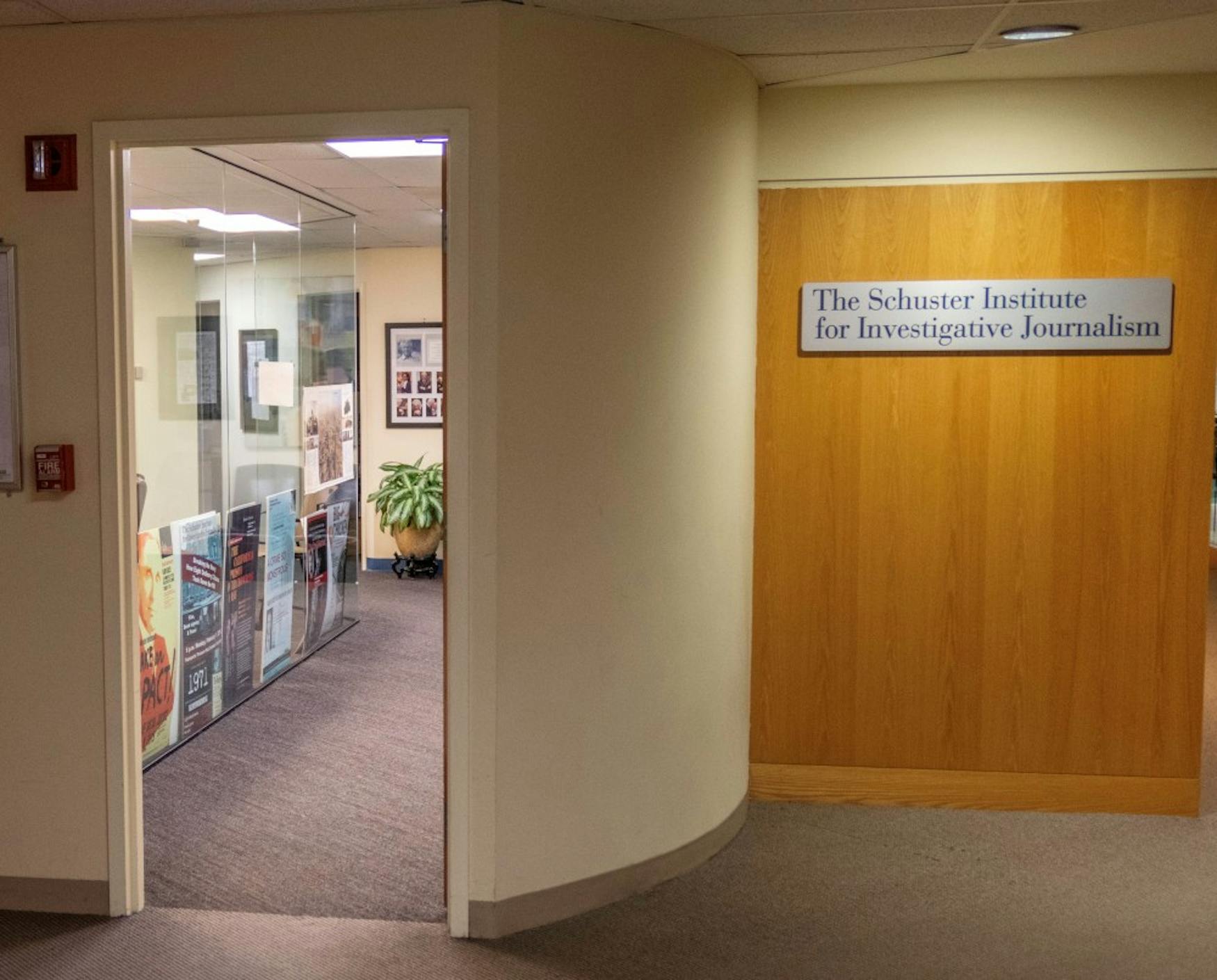Lack of funding forces 'wind down' of Schuster Institute for Investigative Journalism
After struggling to find the necessary funding, the University made the decision to officially close the Schuster Institute for Investigative Journalism on Dec. 31, 2018, Provost Lisa M. Lynch announced in a Dec. 20 email to the Brandeis community. The Schuster Institute, the nation’s first investigative reporting center based at a university and made possible by a generous donation from Elaine and Gerald Schuster, opened 14 years ago at Brandeis. Since its founding in Sept. 2004, the Institute’s team of editors, reporters, fellows and student research assistants worked to preserve investigative journalism as media outlets cut back on that type of reporting.
In addition to the Schusters’ donation, the Institute received grants from foundations such as the Ford Foundation, the Ethics and Excellence in Journalism Foundation, Humanity United and the Morton K. and Jane Blaustein Foundation, according to an email from Florence Graves. Graves, an award-winning investigative journalist and editor, was the founder of the Schuster Institute and directed it since its beginning. It was also supported by gifts of various sizes from individuals.
After the initial gift from the Schusters ran out, however, the Institute struggled to find sufficient funding from other sources that would cover the cost of its work. For the last three years, the University had subsidized the Institute while working with Graves to try to find new grants or gifts, Lynch explained in an email provided by Julie Jette to the Justice. In addition to helping to cover facilities, utilities and administrative costs, the University also provided $450,000 for primary staff salaries.
Research centers like Schuster are supposed to be able to sustain themselves by getting money from external donors instead of being subsidized by the University, President Liebowitz explained in a Jan. 17 joint interview with the Justice and The Brandeis Hoot. As the University takes a new budgetary approach, the administration is trying to become “more conscious and aware of what [they] are subsidizing,” he explained, looking to the costs and contributions that different programs have for the University. “Many academic units and departments are never going to earn a direct dollar in any way, but they are vital to the mission of the institution, and we are going to support them,” he said. “Others however, might be too expensive to support.”
Due to the high cost of the Institute and the inability to find outside funding sources, operations have been winding down, and the University ultimately decided to close the Institute, Lynch explained.
Graves founded the Institute to “help fill the void in high-quality public interest and investigative journalism” by exploring “significant social and political problems,” according to the Institute’s website. The Institute used a “newsroom without walls” model which drew on the work of dozens of fellows, contributors, research assistants and scholars, according to a biography of herself that Graves provided to the Justice. Practicing “impact journalism,” the Institute investigated stories that received little coverage and had the potential to urge social and legal changes if uncovered, and then worked to disseminate their findings to the public and policymakers.
For example, a 2012 article by Schuster reporter E. Benjamin Skinner helped spur the New Zealand government to increase fishing regulations to counter a form of modern-day slavery that had developed in the region, according to a Schuster publication. The Universal Accreditation Act of 2012 worked to prevent corruption in international adoption, drawing on a multi-year Schuster investigation into adoption fraud.
The Institute was the nation’s only independent investigative reporting center that focused on social justice and human rights, according to its website. The Institute’s investigative work was broken into three “beats”: the Political & Social Justice Project, which included the Modern-Day Slavery & Human Trafficking Project, the Gender & Justice Project and the Justice Brandeis Law Project.
The JBLP investigated instances in which individuals were wrongfully convicted for crimes they did not commit, using the research techniques of investigative journalism to uncover the necessary information to exonerate the accused. This team’s work helped exonerate Angel Echavarria and George Perrot, who each spent decades in prison after being wrongfully convicted of murder and rape, respectively.
Schuster was “a gathering of superb investigative journalists working across a breathtaking array of issues” in which everyone was “each others’ cheerleaders and vocational counselors,” wrote Madeline Drexler, who was a senior fellow from 2009 through the Institute’s closing, in an email to the Justice. For Drexler, the Institute was “the kind of support that every journalist craves.”
As one of the University’s research centers, the Institute was not an academic department, but it provided jobs and internships for University students to work as research assistants. In an email to the Justice, Graves explained that she had seen how “incredibly valuable” student researchers could be during a fellowship earlier in her career at the Radcliffe Public Policy Center. She helped implement a similar program at Brandeis’ Women’s Studies Research Center before founding Schuster, and she knew from the beginning of the Institute that she wanted to employ paid student research assistants.
“Given our small staff and the complexity of our investigations, we could not have accomplished as much as we did without the exceptional students we hired and had the pleasure of working with,” Graves wrote in the same email. As the Institute developed, Graves was able to hire more student research assistants, and as recently as a year and a half ago, Schuster employed 35–40 students each year, she elaborated. The Institute had only three full-time employees and several part-time staff members besides their student assistants, per Lynch’s Dec. 20 email.
When asked to reflect on the Institute’s legacy, Graves highlighted how Schuster created “an atmosphere that encouraged our contributors no matter their roles or ages to help each other on the mission of our work.”
Most of the research assistants were majoring or minoring in disciplines outside the Journalism program, Graves explained. This allowed the Institute to hire students whose coursework aligned with the specific work that senior fellows were conducting.
Cecile Afable ’16 worked on the JBLP at Schuster both as an undergraduate research assistant and then remotely after graduation. Working at the Institute taught her to think critically about assumed facts, developed the research skills she would use in her thesis and showed her “the benefit of slow, deep work over time” to create a positive impact on the world, she explained in an email to the Justice, writing, “The fact that Schuster could help students learn how to do that kind of intensive research — on interesting topics — and PAID them for it … with relatively flexible scheduling … attests to its unique position as a provider of part-time student jobs,” she wrote.
Schuster Institute fellows mentored their research assistants and often worked to ensure the students were credited when the work was eventually published, Graves explained. Journalism minors could also get internship credit toward the minor by working at the Institute.
The Journalism program at Brandeis, however, has seen a recent decline in enrollments, with the number of minors falling from 32 in 2014 to 16 three years later, according to the Provost’s Office in an email from Julie Jette. Dean of Arts and Sciences Dorothy L. Hodgson and Program Director Eileen McNamara have discussed ways to reverse this trend, including potentially hiring a new faculty member with digital media experience or broadening the program’s focus.
In her email announcing the Institute’s closure, Lynch wrote that the University hopes “... to find new ways to integrate such mentoring and practical experience with journalism” once provided by Schuster into other “academic programs and residential living communities.”
Despite Schuster’s closing, the Institute’s work has not entirely ended. Graves, along with her student research assistants, will continue to work on the JBLP at least until the end of the 2018-19 academic year. The International Center for Ethics, Justice and Public Life will provide space for the researchers, while the space that used to house the Institute will return to being Goldfarb Library space, according to Lynch’s statement courtesy of Jette.
The researchers are in the middle of investigating several wrongful convictions, and Graves was able to secure a donation to cover the costs of finishing those projects, she explained in an email to the Justice. She intends to continue working on those investigations even after the end of July if they are not yet complete by then, explaining that those whose convictions are in question see Schuster as a “last resort” and “are depending on us.”
In her email to the Justice, Lynch explained that the University plans “to continue investigative journalism through the Ethics Center, albeit at a much-reduced scale than what we were able to do in the past in the Schuster Institute.”
Lindsay Markel ’08 worked at Schuster for four years after graduation, eventually becoming associate director. In an email to the Justice, she reflected, “I started working at the Institute as an unsophisticated college graduate, and was lucky enough to meet incredible role models - exactly the kind I needed as a young woman - that helped me grow. I didn't just learn how to do the painstaking, challenging, thrilling work of investigative journalism; I also learned to feel confidence in myself and my abilities, and to advocate for myself in the world.”
Graves described the work that the Institute did as investigating “institutional systems that had failed” and become “calcified and unwilling to change.” She reflected that she believed that many of their student research assistants would go on to join and gain power within these institutional systems.
“We wanted our incredibly bright, committed and idealistic students to see through their work that how systems that haven’t been willing to change or reassess can do serious harm to individuals, their families and ultimately society writ large,” she wrote, adding, “I let them know my hope was that when they are in positions of power one day, and things they are responsible for aren’t working well or are in crisis, they will remember and be emboldened to act.”
—Editor’s Note: Senior Editor Amber Miles and News Editor Sam Stockbridge work at the Schuster Institute for Investigative Journalism.
—Jen Geller contributed reporting.




Please note All comments are eligible for publication in The Justice.